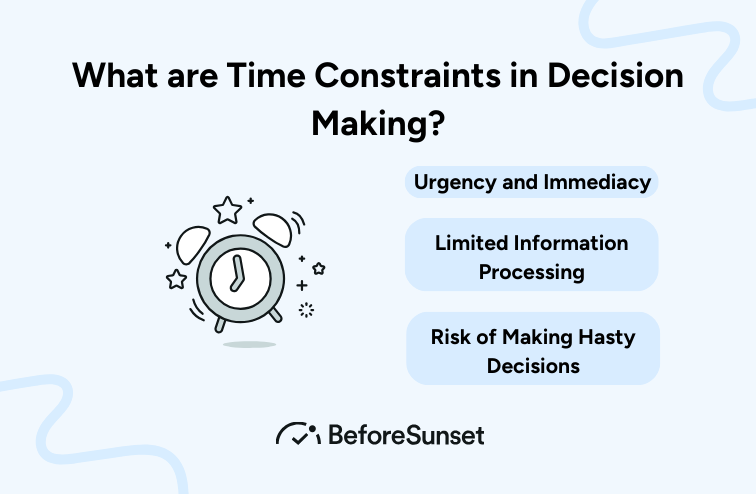Time Constraint: 10 Tips to Keep Your Project on Schedule

%20(1).png)
Table Of Contents
In today's fast-paced project management market, where deadlines and deliverables are paramount, understanding the art of keeping projects on track is an essential ability.
The triad of project constraints—time, scope, and cost—is the foundation of successful project management.
However, in this blog, we will focus on the main topic: time constraints.
We'll delve into their complexities, look at other project management restrictions, and underline the critical role time plays in project success.
Furthermore, we will provide you with practical techniques for effectively managing time restrictions, such as insights into delegating and the power of saying "no."
The Three Project Constraints Meaning
Project managers must negotiate the intricate interplay of three key constraints: time, scope, and money.
While they are linked, knowing the specific importance of time limitations is critical for project success.
A deviation in one can lead to problems in the others, highlighting the delicate balance required in project management.
Additional Project Management Constraints
Beyond the primary triumvirate, project managers grapple with a myriad of additional constraints.
Resource availability, quality standards, and external dependencies introduce layers of complexity.
A nuanced understanding of these constraints is indispensable for effective project planning and execution.
The Importance of Time Constraint
Time is an important resource, and good management is critical to project success.
Meeting deadlines not only meets client expectations but also boosts team morale and ensures project success.
The significance of time constraints resonates throughout the project life cycle.
Managing the Time Constraint

1 – Agree on a Manageable Time Constraint With Your Stakeholders
Collaborative decision-making with stakeholders is the cornerstone of effective time management.
Set realistic and achievable time constraints through open communication, aligning expectations and project objectives from the outset.
2 – Map Out the Project Timeline
Making a complete project timeline is similar to building a road plan for success.
A visual representation of critical milestones and dates improves comprehension by presenting a clear path for the project's progress.
3 – Manage your Team's Availability
Successful time management necessitates coordinated efforts.
Team coordination and communication are critical in ensuring that team members are not just aware of project deadlines, but also prepared to meet them.
4 – Assign Time Constraints to Tasks
Granular task planning is required for efficient time management.
Divide the project into discrete tasks and apply time limitations to each.
5 – Track Task Time Constraints Against Estimations
Regularly tracking job progress against initial estimates is a proactive approach to time management.
Identifying potential delays early enables for quick corrective actions, which reduces the impact on the total project timetable.
6 – Analyze Tracked Time Reports for Insight
The data obtained by time monitoring reports is a treasure of information about team performance and project efficiency.
Leveraging this information enables project managers to make data-driven decisions, which contributes to continual improvement.
7 – Work in Smaller Iterations to Stay Flexible
The use of agile approaches, which emphasize short iterations, improves adaptability.
This iterative method ensures that teams may readily alter plans in response to changing project needs, unexpected challenges, and shifting priorities.
8 – Be Prepared to Adjust Your Plans
Flexibility is a key component of efficient project management.
Being willing to alter plans in real time based on new information and changing conditions is critical for keeping the project on track and ensuring success.
9 – Delegation
The art of delegation is a valuable tool in the time management arsenal.
Assigning assignments based on team members' talents and knowledge not only saves time, but also promotes collaboration and good performance in the workplace.

Benefits of Delegation:
- Improves total team productivity.
- Improves team skills and encourages collaborative problem-solving.
10 – Learning to Say “No”
The ability to say "no" is a sometimes underrated yet critical skill in time management. Knowing when to deny new assignments or requests helps that the team stays focused on the most important duties.
Improves total team productivity.
Improves team skills and encourages collaborative problem-solving.

Importance of Learning to Say No:
- Reduces overcommitment and burnout.
- Maintains team bandwidth for key tasks.
- Maintains an uncompromising project focus.
Use Teamwork to Manage the Time Constraint
Enter modern project management solutions such as Teamwork.
Its user-friendly features make it easier to log time, assign tasks, and collaborate.
By adopting Teamwork, project managers enable their teams to traverse the complexities of time management, ensuring that projects not only meet but exceed their objectives.
What are the Main Time Constraints in a Project?
A thorough awareness of common time limitations, such as external dependencies, resource availability, and task dependencies, is critical for successful project planning.
To keep the project moving forward, each limitation demands careful management.
Can the Time Constraint Be Effected by Other Project Constraints?
Indeed, the time limitation is inextricably connected to scope and cost constraints.
Changes in one limitation frequently echo through the others, necessitating a comprehensive and responsive project management strategy.
What are Time Constraints in Decision Making?

Time constraints in decision-making are the limitations imposed by the availability of time while making choices or reaching conclusions. Individuals and organizations must deal with the strain of limited time resources in a variety of situations, which influences decision-making in a variety of ways.
Urgency and Immediacy
Time limits generate a sense of urgency, requiring decisions to be made quickly. To stay ahead of the curve in situations with approaching deadlines or fast changing circumstances, quick evaluations and prompt responses are required.
Limited Information Processing
The time available for decision-making frequently limits the amount of information that can be gathered, processed, and analyzed. Decisions may need to be taken with insufficient facts, necessitating a balance between thoroughness and timeliness.
Risk of Making Hasty Decisions
The pressure of time limits increases the risk of making hasty decisions without taking into account all important aspects. Individuals may value speed over depth, which can lead to inferior results.
Trade-Offs and Prioritization
Time limits require decision-makers to make compromises and prioritize certain areas over others. This entails determining which key elements must be addressed within the available timescale, while understanding that not all factors can be given equal priority.
The Impact on the Complexity of Decisions
The intricacy of decisions may be influenced by time restrictions. When time is of the essence, decision-makers may prefer simpler, more easy solutions that can be executed quickly, even if more complex ones may provide higher long-term benefits.
Stress and Cognitive Load
Time limits add to stress and increased cognitive load for decision-makers. Managing limited time involves mental agility and the ability to process information efficiently, which affects overall cognitive load during decision-making.
Influence of Decision-Making Styles
Time restrictions can influence decision-making styles. In time-sensitive situations, autocratic or directive decision-making styles may be used, with a single decision-maker in charge to speed up the process.
Strategic Planning and Resource Allocation
Decision-makers must carefully plan and deploy resources within the time constraints. This includes establishing essential priorities, distributing resources efficiently, and aligning actions with overall goals in order to achieve deadlines.
Balancing Thoroughness with Timeliness
Decision-makers are faced with the dilemma of balancing thoroughness and timeliness. While a thorough analysis is preferable, time constraints may dictate a more pragmatic approach to ensuring judgments are made within reasonable time frames.
Adaptation to Changing Conditions
Time restrictions require adaptability. Decision-makers must be agile in responding to changing events, adapting their plans and decisions as new information becomes available within the short time frame.
What is There to Conclude?
In the broad tapestry of project management, managing time restrictions is an art form that determines achievement.
With the insights and practical tips provided in this blog, project managers will be able to confidently navigate the complicated landscape of time management.
BeforeSunset AI serves as a beacon, providing creative solutions to assist individuals and teams in their quest for efficient project planning.
Embrace the wisdom of time management, stay ahead of deadlines, and improve your project management skills using BeforeSunset AI.






.png)
.png)
.png)
.png)
